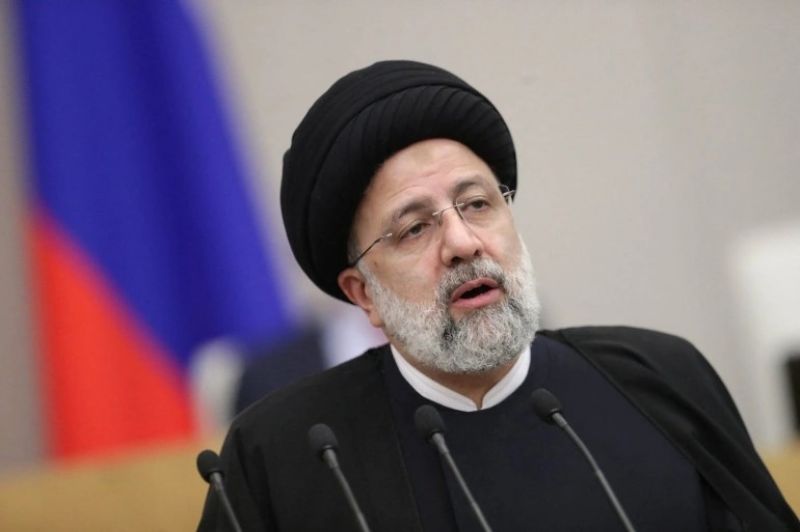- Danger warning issued for Bangkok as extreme heat bites |
- Severe heat wave continues in parts of Bangladesh |
- Despite relaxed terms, Dhaka missed IMF forex reserves target |
- 'So hot you can't breathe': Extreme heat hits the Philippines |
- PM Hasina departs for Thailand on six-day official visit |
Iran’s Raisi pushes regional diplomacy as nuclear tensions rise

File photo
The administration of President Ebrahim Raisi in Iran is continuing its push for regional diplomacy as tensions with the West over its nuclear programme continue to build up.
The conservative president came to power in August 2021 with the promise of “extending a hand of friendship and brotherhood” to other nations, with a special focus on the region.
His officials continue to advocate for a “balanced” foreign policy approach that does not neglect any opportunity to improve relations – with the exception of Israel – but his administration has so far been mostly only successful in strengthening ties with only the east.
Tehran has seen a flurry of diplomatic activity in the past year, and Raisi has dedicated all his foreign travels as president to allies and potential friends in the east – with an emphasis on boosting economic cooperation.
The Iranian capital hosted three presidents in June alone.
Last week, Kassym-Jomart Tokayev, president of Kazakhstan, met Raisi and led a high-level delegation that signed several cooperation agreements.
The 40-year-old new president of Turkmenistan, Serdar Berdymukhamedov, also led a top-tier political and economic delegation during his state visit last week at the invitation of Raisi. The two sides signed eight agreements on political, economic and cultural cooperation, according to the Iranian president’s office.
Raisi has called for moving towards signing decades-long cooperation accords with both nations.
Iran’s only major ally in South America, President Nicolas Maduro of fellow United States-sanctioned Venezuela, was also in Tehran earlier this month to sign a 20-year cooperation plan, echo a message of fighting imperialism, and discuss furthering relations in trade, energy, tourism, and technology.
Syrian President Bashar al-Assad renewed his support for Iran’s regional stances, especially on Palestine, as he made a surprise visit in May, his second since the war in Syria war began more than a decade ago.
Moreover, Raisi has capitalised on an opportunity to boost ties with Qatar, which has grown significantly closer to Iran as the latter backed it during a years-long blockade by a coalition of Arab states led by Saudi Arabia. Raisi signed 14 agreements during a trip to Doha in February, and the Qatari emir, Sheikh Tamim bin Hamad Al Thani, travelled to Tehran weeks later as the two also explore cooperation during the upcoming football World Cup tournament.
All those leaders were also granted an audience with the Iranian supreme leader, Ayatollah Ali Khamenei, indicating the country’s seriousness in trying to deepen ties.
Iran and Oman also pledged to strengthen relations and signed 12 agreements in May, when Raisi made the first state visit by an Iranian president to Muscat since the 2020 passing of Sultan Qaboos bin Said.
Next in line, Iran has Turkey in its sights, as a visit by President Recep Tayyip Erdogan has been in discussion since last year. It has yet to work out, however, among other things because of Turkey’s relations with Israel.
But Iran’s biggest pivot has been towards China, the largest purchaser of its oil under US sanctions, and Russia, which may be perceived as more eager to expand ties especially after facing Western sanctions for its invasion of Ukraine.
Iran said in January that its 20-year cooperation accord with China has entered the implementation stage, while Raisi offered Iran’s proposals for renewing a 20-year agreement to Russian President Vladimir Putin during a visit to the Kremlin the same month.
‘The economic aspect’
The word “region” has always been important in Iran’s foreign policy approach, but Raisi has introduced a major focus on “geoeconomics” to it, according to Mohsen Shariatinia, assistant professor of international relations at Tehran’s Shahid Beheshti University.
“The Raisi administration pursues two goals,” he told Al Jazeera. “To maintain Iran’s position in the fragile balance of power in the region, and to intertwine Iran’s economy with those of its surrounding environment. The economic aspect is relatively new.”
Shariatinia pointed out there can not be much “balance” in Iran’s foreign policy approach at the moment as power centres in Tehran are increasingly of the belief that Washington lacks the will to lift its harsh sanctions.
Just last week, the US introduced new sanctions aimed at hurting a network of Iranian petrochemical producers, reports BBC.

